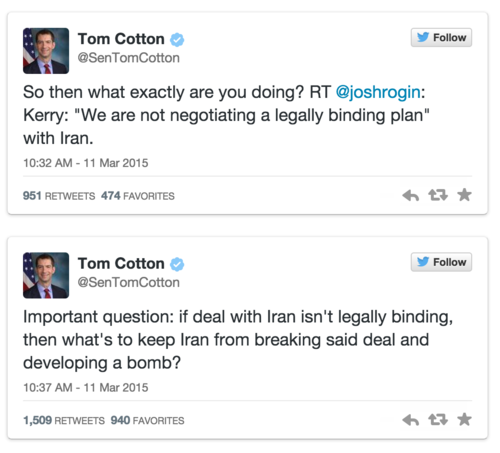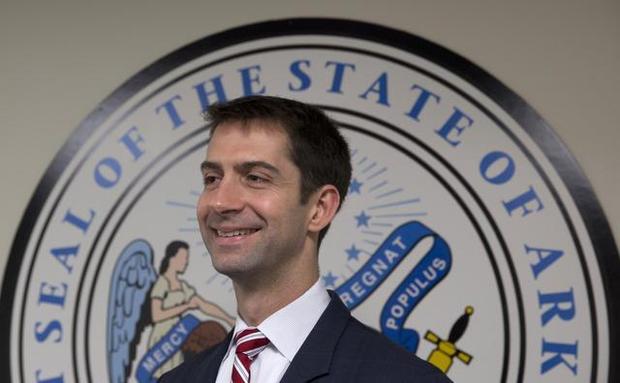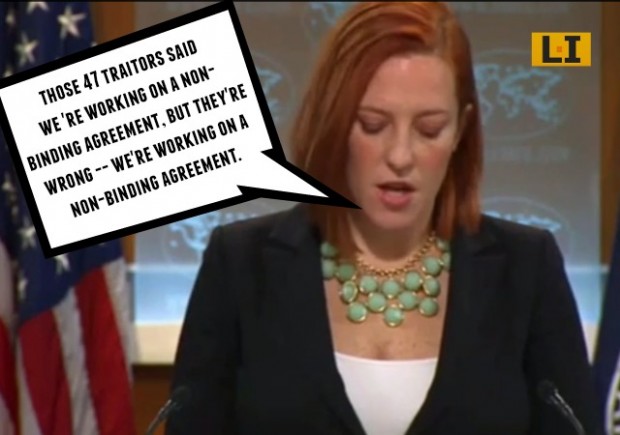If you want to know what’s in the Nuclear Deal with Iran — Ask Tehran
Yesterday, we wrote how 47 Republican Senators, led by Arkansas U.S. Senator Tom Cotton, did us a real favor when they sent an open letter to the “Leadership of the Islamic Republic of Iran”. By published the open letter to Iran’s leaders, responses from Tehran revealed that the Congress may be by-passed and its approval might not be required to ratify a nuclear deal with Iran. Secretary of State Kerry indicated during his Senate Armed Services Hearing Wednesday that the Memorandum of Understanding was “non-binding” and thus no approval was required. State Department Spokesperson Jen Psaki affirmed that position. The White House “We the People” website petition campaign created by “C.H.” of Bogota, New Jersey accused the 47 signatories of ‘traitorous’ actions violating the 1799 Logan Act which bars private persons, but not members of Congress, from conducting foreign relations was simply a smokescreen. Ditto for the New York Daily News front page and editorial declaration published Tuesday.
Two independent legal experts confirmed the Constitutional requirements for review of foreign treaties and Congressional executive agreements. Sen. Cotton’s letter also pointed out that any executive order signed by the President may not survive past the end of his term in 22 months and might be modified or terminated for cause by any successor. That raised a question of why the Memorandum of Understanding was non-binding. That provoked responses from both Foreign Minister Zarif and Supreme Ruler Ayatollah Khamenei. While the latter railed in rhetoric about how the GOP initiative reflected “the disintegration of the U.S.” and why our representations can’t be trusted and laughing at the State Department citing Iran as a state sponsor of terrorism. It was left to Foreign Minister Zarif, to reveal that Congress wouldn’t have to approve anything saying: “The executive agreement was not bilateral but rather multi-lateral with the rest of the Permanent Members of the UN Security Council, plus Germany, subject to a resolution of the Security Council.”
Tzvi Ben-Gedalyahu wrote in a Jewish Press article published today, “U.N. Security Council’s lifting of sanctions and endorsement of a deal might make Congress irrelevant.” He then cites the observation of Omri Ceren, Communications Director for the Washington, DC-based The Israel Project:
The letter forced the Administration to explain why they’re icing Congress out of Iran negotiations, and now that explanation has ignited a firestorm. The administration looks like it intentionally chose a weaker, non-binding arrangement, rather than a treaty, to avoid Senate oversight
After we published our clarification of Sen. Cotton’s letter, our colleague Ken Timmerman wrote and thanked us for our piece. He said more would be revealed in his FrontPage Magazine, article published today, “Iran Deal Secrets Revealed – by Iran.”
Here are some excerpts from the Timmerman article.
On why Zarif said Congressional approval wasn’t required:
That if the current negotiation with P5+1 result[s] in a Joint Comprehensive Plan of Action, it will not be a bilateral agreement between Iran and the US, but rather one that will be concluded with the participation of five other countries, including all permanent members of the Security Council, and will also be endorsed by a Security Council resolution.
Timmerman’s observation:
The Obama administration has told Congress that it won’t submit the nuclear agreement with Iran for Congressional approval, but now Zarif is saying that it will be submitted to the United Nations, to form the basis of a United Nations Security Council resolution, presumably aimed at lifting UN sanctions on Iran.
That prompted Sen. Coker (R-TN) and Foreign Relations Senate Committee chair co-sponsor of The Iran Nuclear Agreement Review Act of 2015 to write President Obama Thursday:
There are now reports that your administration is contemplating taking an agreement, or aspects of it, to the United Nations Security Council for a vote.
Enabling the United Nations to consider an agreement or portions of it, while simultaneously threatening to veto legislation that would enable Congress to do the same, is a direct affront to the American people and seeks to undermine Congress’s appropriate role.
Timmerman then recounts the repeated Iranian violations of the interim Joint Plan of Action adopted in November 2013 and how the Administration has caved to Iran’s demands:
When the negotiations began, the U.S. was insisting that Iran comply with five United Nations Security Council resolutions and suspend all uranium enrichment. Now the discussion is on how many centrifuges Iran can spin, and more importantly, how many new generation (and more efficient) centrifuges Iran can install.
On issue after issue, it’s the United States – not Iran – that has given way. When Iran got caught violating the terms of the November 2013 agreement within the first two months, by enriching fresh batches of uranium to 20%, the United States pretended not to notice.
When the International Atomic Energy Agency revealed that Iran had produced fresh batches of 20% uranium on Jan. 20, 2014, no one called it a violation, highlighting instead Iranian steps to convert a portion of the 20% uranium into fuel rods for a research reactor.
Anyone who was been observing Iran’s nuclear cheat and retreat over the past twenty years recognizes the pattern: Iran is constantly pushing the limits, and when they get called out, they take a step backwards until they think we are no longer watching, when they do it again.
And we never punish them. Not ever.
Timmerman asked a rhetorical question and gave the obvious answer:
Can Obama legally circumvent Congress and go directly to the United Nations?
Undoubtedly, just as he could ignore multiple U.S. laws – and his own statements – that prevented him for granting amnesty to millions of illegal aliens by Executive Order.
But if the Iranians really believe they can find sanctuary from Congress in Turtle Bay, former White House speech writer Marc Thiessen suggests they should think again.
“The US constitution trumps international law. The U.S. constitutional trumps the United Nations,” he told FoxNews anchor Megyn Kelly on Thursday. “The Supreme Court has actually ruled on this.”
It should be crystal clear to anyone observing the U.S.-Iran charade what Tehran wants from these talks: absolute victory over the United States.
Iran’s “moderate” president Hassan Rouhani, a former nuclear negotiator himself, said it the day the November 2013 agreement was announced: “In #Geneva agreement world powers surrendered to Iran’s national will,” he tweeted victoriously.
So why is Iran engaging in this subterfuge? It is all about achieving victory, meaning continuing the inevitable development of nuclear weapons, and having their financial sanctions lifted:
This is the deal-maker for the Iranian regime, the one thing they want so bad they actually will make concessions to achieve it.
But wait: even though the Iranians claim the sanctions are unjust, and that all the sanctions imposed over the past two decades must be removed instantaneously for a deal to be signed, that does not mean they will walk away if some sanctions stay in place.
“What they really care about are the financial sanctions,” an Iranian businessman familiar with the way the Tehran regime moves money told me. “As long as they can use and move dollars, the rest they don’t care about.”
Iran has lived so long with sanctions on dual use technology and weapons procurement that they have learned how to get around them. “They can get anything they want,” the businessman told me. “It may cost them 5 percent or 10 percent more, but they consider that the cost of doing business.”
So be prepared for a last minute, Hail Mary deal that will lift financial sanctions on Iran in exchange for Iranian promises not to build the bomb.
If such a deal will prevent or even delay a nuclear holocaust in the Middle East is anyone’s guess.
Remember, Sen. Cotton’s observation in a Tweet, after hearing Secretary Kerry’s testimony on Capitol Hill, Wednesday:
 EDITORS NOTE: This column originally appeared in the New English Review. The featured image is of Secretary of State John Kerry, left, and Iranian Foreign Minister Javad Zarif, second from right. Source: CNN September 2014.
EDITORS NOTE: This column originally appeared in the New English Review. The featured image is of Secretary of State John Kerry, left, and Iranian Foreign Minister Javad Zarif, second from right. Source: CNN September 2014.



